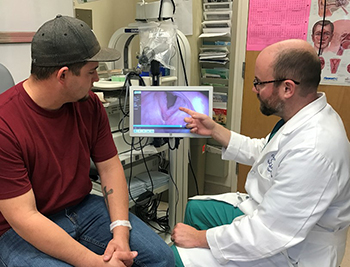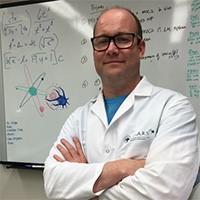May 14, 2018 update: Watch an archived webcast of this talk on the NIH videocast website.
On Tuesday, May 8, 2018, Clint T. Allen, M.D., will discuss a National Institutes of Health (NIH) clinical trial in which his research team is exploring ways to shrink benign (noncancerous) tumors in the airways caused by certain strains of the human papillomavirus (HPV). This lecture is part of a series of talks by NIDCD researchers called Beyond the Lab, Understanding Communication Disorders. The speaker series is an opportunity for everyone inside and outside of the NIH—administrative staff, support staff, scientists, and the public—to learn about the NIDCD’s recent advances in communication disorders, conditions that significantly affect about 20 percent of U.S. adults during their lifetime.
Dr. Allen's research team is harnessing knowledge about how the immune system fights cancer to test a treatment for a rare disorder called recurrent respiratory papillomatosis (RRP), in which benign tumors grow rapidly in the air passages leading from the nose and mouth and into the lungs. Emerging evidence suggests that virus-associated disorders such as RRP may respond well to immunotherapy. This research could lead to new treatments for RRP and for head and neck cancers.
There is no cure for RRP, which can affect both children and adults; the only treatment is to surgically remove tumors, which often reoccur. The tumors frequently grow on the larynx (voice box), leading to breathing problems and severe voice disturbances.
Dr. Allen is a surgeon-scientist in otolaryngology (diseases of the ear and throat) and principal investigator of the Translational Tumor Immunology Program at the NIH’s National Institute on Deafness and Other Communication Disorders (NIDCD).

- What: “Harnessing the Immune System to Fight HPV-Related Tumors in the Airway,” part of the NIDCD Beyond the Lab, Understanding Communication Disorders Speaker Series
- Who: Clint Allen, M.D., otolaryngology surgeon-scientist in the NIDCD Translational Tumor Immunology Section
- When: Tuesday, May 8, 2018, 11:00 a.m.-noon
- Where: John Porter Neuroscience Research Center, Building 35A, Rooms 620/630, NIH campus, Bethesda, Maryland
You can also view the presentation via videocast.
For questions or reasonable accommodation requests, contact Lonnie Lisle at 301-827-8183.
About the Speaker

Clint T. Allen received an M.D. from Texas A&M University’s College of Medicine and completed his clinical training in Otolaryngology-Head and Neck Surgery at Washington University in St. Louis, with advanced training in Laryngological Surgery at the University of Washington in Seattle. He is an alumnus of the Clinical Research Training Program at the NIH, where, under Dr. Carter Van Waes, he studied alterations in oncogenic signaling pathways within head and neck cancer cells. During his clinical residency training, he helped characterize newly developed syngeneic models of oral cavity cancer developed in the laboratory of Ravindra Uppaluri.
As a Principal Investigator in the NIDCD Translational Tumor Immunology Program, he currently seeks to enhance responses to immune-activating anti-cancer treatments by studying therapeutic approaches to reverse local immunosuppression within the tumor. Dr. Allen holds a faculty appointment in the Johns Hopkins School of Medicine Department of Otolaryngology-Head and Neck Surgery, and has an active otolaryngology clinical practice in Bethesda, Maryland. He is also a member of the inpatient otolaryngology consultation team at the NIH Clinical Center. He joined the NIDCD as an investigator in the Otolaryngology Surgeon-Scientist Development Program in late 2013.

